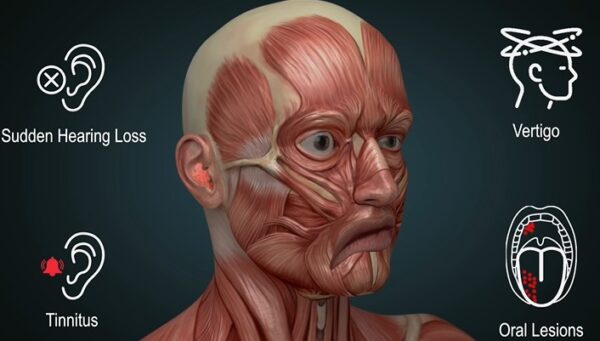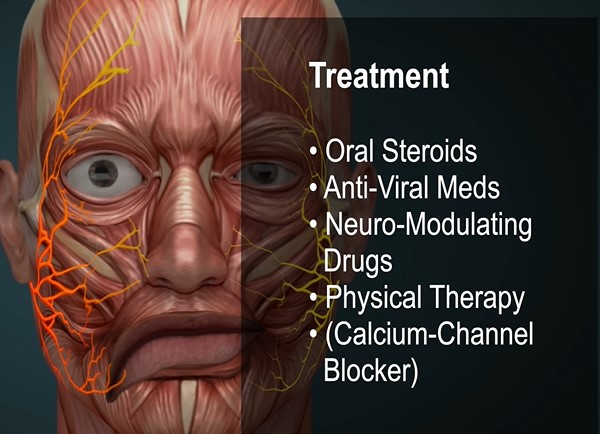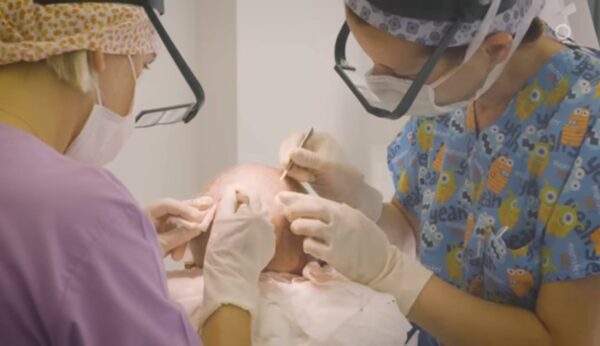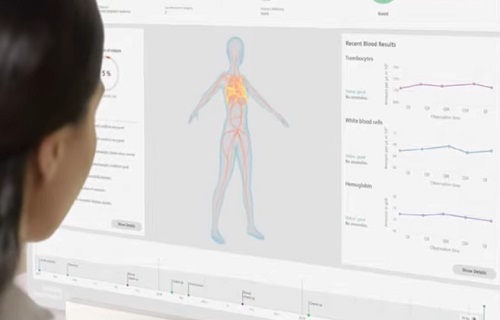What is Ramsay Hunt Syndrome?
Ramsay Hunt Syndrome, also known as Herpes zoster oticus, is a viral infection that affects the facial nerve and the ear. It is caused by the varicella-zoster virus, which is the same virus that causes chickenpox and shingles.
This syndrome is characterized by a painful rash that develops in the ear canal or on the outside of the ear, along with facial paralysis or weakness on one side of the face. Other symptoms may include dizziness, hearing loss, ringing in the ears and difficulty with taste or dry mouth. This condition is named after James Ramsay Hunt, who first described the syndrome in 1907.
Statistics About Ramsay Hunt Syndrome
The rates of Ramsay Hunt Syndrome is estimated to be around 5 to 15 cases per 100,000 people per year. It can affect people of all ages, but it is more common in older adults. In terms of gender, there appears to be no significant difference in incidence rates between males and females. But some studies suggest that the syndrome may be slightly more common in men.
Ramsay Hunt Syndrome not typically considered a life-threatening condition. But, in certain cases, complications such as pneumonia or encephalitis (inflammation of the brain) may develop, which can be more serious.

What Are The Causes Of Ramsay Hunt Syndrome?
Ramsay Hunt Syndrome is caused by the varicella-zoster virus, which is the same virus that causes chickenpox and shingles. After a person recovers from chickenpox, virus can remain dormant in the nervous system for many years. Later in life, the virus may reactivate and cause shingles.
In some cases, the virus can also affect the facial nerve and the ear, leading to Ramsay Hunt Syndrome. The exact mechanism by which the virus affects the facial nerve and ear is not fully understood but it is thought to involve inflammation and damage to the nerve tissue.
What Are The Symptoms Of Ramsay Hunt Syndrome?
Symptoms of Ramsay Hunt Syndrome can change in severity, but here is most common symptoms:
- Painful Rash: Syndrome usually begins with a painful rash that develops in the ear canal or on the outside of the ear.
- Facial Paralysis: Paralysis or weakness of the facial muscles on one side of the face is a common symptom of Ramsay Hunt Syndrome. This can affect the ability to blink, smile or move the mouth normally.
- Hearing Loss Or Ringing in The Ear: The syndrome can cause hearing loss or ringing in the ear (tinnitus) on the affected side.
- Dizziness or loss of balance: Some people may experience dizziness or loss of balance, which can be related to the inner ear inflammation caused by the virus.
- Dry Mouth Or Difficulty With Taste: The virus can affect the salivary glands and cause a dry mouth, as well as alter the sense of taste.
- Headache: Some people may experience headaches, which can be a result of the inflammation caused by the virus.
It is very helpful to seek medical attention promptly if you suspect you may have Ramsay Hunt Syndrome, as early treatment can help improve the outcome and reduce the risk of complications.
What Are The Risk Factors of Ramsay Hunt Syndrome?
Here is the risk factors for Ramsay Hunt Syndrome:
- Age: Ramsay Hunt Syndrome is more common in older adults, particularly those over the age of 60. This may be due to age-related changes in the immune system, as well as the fact that the varicella-zoster virus tends to reactivate more frequently in older adults.
- History Of Chickenpox Or Shingles: If you have had chickenpox or shingles in the past, the varicella-zoster virus may be dormant in your nervous system and can reactivate later in life, potentially causing Ramsay Hunt Syndrome. Risk of reactivation is higher if you had chickenpox before the age of 1, if you had a severe case of chickenpox or if you are immunocompromised.
- Weakened Immune System: If your immune system is weakened due to conditions such as HIV/AIDS, cancer or autoimmune diseases or if you are taking medications that suppress the immune system (such as corticosteroids), you are at increased risk of developing Ramsay Hunt Syndrome. This is because a weakened immune system makes it easier for the varicella-zoster virus to reactivate and cause disease.
- Stress: Stress can weaken the immune system and increase the risk of reactivation of the varicella-zoster virus. This may explain why some people develop Ramsay Hunt Syndrome during periods of high stress.
- Gender: While Ramsay Hunt Syndrome can affect people of any gender, some studies suggest that it may be slightly more common in men than women.
- Genetics: There may be a genetic component to the risk of developing Ramsay Hunt Syndrome, although more research is needed to fully understand this link.
What is Treatment Way For Ramsay Hunt Syndrome?
Here is some information on the treatment options for Ramsay Hunt Syndrome:
- Antiviral Medication: Antiviral medication is typically the first line of treatment for Ramsay Hunt Syndrome. These medications work by stopping the replication of the varicella-zoster virus, which can help to reduce the severity and duration of symptoms. The antiviral medication is most effective when started within 72 hours of the onset of symptoms. The most commonly used antiviral medications for Ramsay Hunt Syndrome include acyclovir, valacyclovir and famciclovir.
- Corticosteroids: Corticosteroids are a type of medication that helps to reduce inflammation and swelling in the affected nerve. They are usually given in combination with antiviral medication to help reduce the severity of symptoms. The most commonly used corticosteroid for Ramsay Hunt Syndrome is prednisone.
- Pain Relief Medication: Pain is a common symptom of Ramsay Hunt Syndrome and pain relief medication such as acetaminophen or nonsteroidal anti-inflammatory drugs (NSAIDs) may be prescribed to help manage this.
- Physical Therapy: If the facial muscles are affected by the syndrome, physical therapy may be recommended to help improve muscle function and prevent long-term complications. A physical therapist can teach exercises to help strengthen the affected muscles and improve coordination.
- Eye Care: If the eyelid cannot close fully, eye drops or an eye patch may be used to help protect the eye from damage and prevent dryness. In some cases, a temporary surgical procedure called a tarsorrhaphy may be performed to partially close the eyelid.
- Supportive Care: In addition to medical treatment, supportive care can also help to manage symptoms of Ramsay Hunt Syndrome. This may include rest, adequate hydration and a soft diet if there are difficulties with swallowing.
How Long Does Ramsay Hunt Syndrome Last?
Duration of Ramsay Hunt Syndrome can change according to the severity of the symptoms and the promptness of treatment. In general, acute phase of Ramsay Hunt Syndrome lasts for several weeks. During this time, people may experience a range of symptoms such as facial weakness or paralysis, ear pain, hearing loss, vertigo and difficulty with taste and speech.
Treatment with antiviral medication and corticosteroids can help to reduce the severity and duration of symptoms. It is very helpful to seek prompt medical attention if you suspect you may have Ramsay Hunt Syndrome to improve your chances of a successful outcome.
After the acute phase of the syndrome has passed, some patients may experience long-term complications such as hearing loss or facial weakness. Rehabilitation, including physical therapy and speech therapy, can help to improve muscle function and prevent long-term complications.
Is Ramsay Hunt Syndrome Cause Brain Damage?
While it can cause significant discomfort and can lead to long-term complications such as hearing loss and facial weakness, it generally does not cause brain damage. But in some rare cases, Ramsay Hunt Syndrome can lead to more severe complications such as meningitis or encephalitis, which can affect the brain and cause inflammation or damage. These complications are more likely to occur in individuals with weakened immune systems or those who do not receive prompt medical treatment.

What is Ramsay Hunt Syndrome Natural Treatment Ways?
There is no known natural cure for Ramsay Hunt Syndrome and it is important to seek medical attention from a qualified healthcare professional for proper diagnosis and treatment. But there are some natural remedies and lifestyle changes that may help to manage symptoms and improve health during and after treatment:
- Rest And Relaxation: Rest and relaxation are important for the body to heal and recover. Avoiding stress and getting plenty of sleep may help to reduce symptoms of Ramsay Hunt Syndrome.
- Gentle Exercise: Gentle exercise such as walking or yoga may help to improve circulation and reduce muscle tension. It is important to talk to your healthcare provider before starting any exercise program.
- Dietary Changes: Eating a healthy diet with plenty of fruits, vegetables and whole grains may help to support the immune system and improve overall health. Avoiding processed foods and sugary drinks may also be beneficial.
- Herbal Remedies: Some herbal remedies may have anti-inflammatory or antiviral properties that may help to reduce symptoms of Ramsay Hunt Syndrome. However, it is important to talk to your healthcare provider before using any herbal remedies as they may interact with medications or have side effects.
- Acupuncture: Acupuncture may help to reduce pain and improve circulation. It is important to talk to your healthcare provider before trying acupuncture as it may not be appropriate for all individuals.
We wish healthy and happy life for you. Beside that you can find helpful advices for Ehler -Danlos in below link.

